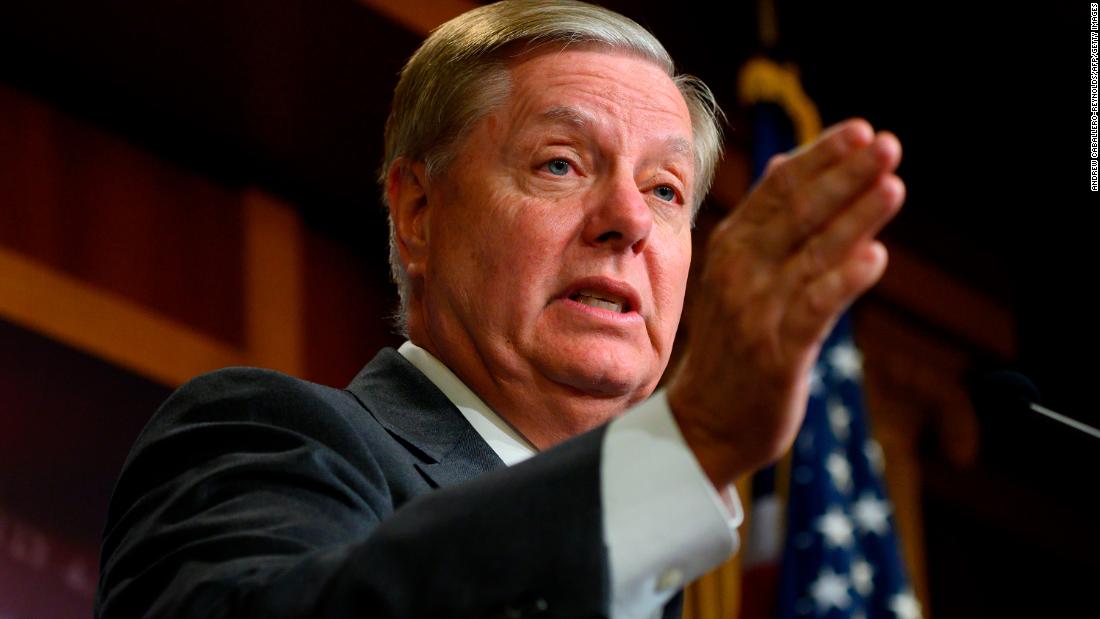But, to succeed, this strategy would require Trump to abandon the most dominant traits of his unchained personality and political method — the qualities that led him to fame and fortune, powered his unlikely political rise and made him America’s most unusual President.
The idea that Trump, always his own most vehement advocate, would swallow his fury and retreat behind a team of lawyers and professional political spinners is impossible to imagine. After all, he has effectively trashed the communications infrastructure that normal presidents use — preferring to handle everything himself in wild chats with reporters.
And the notion that the President would talk about anything other than impeachment and quietly get on with his job of governing — a task for which he has rarely shown much appetite in the first place — also seems fantastical in the extreme.
Yet that is what Graham, a South Carolina Republican, effectively asked the President to do on Thursday.
Graham was asked about the White House’s frequently changing impeachment messaging by a reporter Thursday, and quipped “Have you noticed?” before going on to praise Clinton — the man Graham tried to oust from office as a House impeachment manager two decades ago.
“What he did is he had a team that was organized, had legal minds that could understand what was being said versus the legal proceedings in question,” Graham said.
“And they were on message every day.”
Graham argued that Clinton defended himself but never stopped being President and that was the key to his survival and eventual acquittal in a Senate trial.
“The public may not have liked what the President had done but believed that he was still able to do his job … I’m hoping that will become the model here.”
In his book, “The Clinton Tapes,” based on contemporaneous conversations with the President, the historian Taylor Branch paraphrased the former commander-in-chief’s mindset.
“His best course was to concentrate on his job. He had no higher aspirations for the present, but he thought detachment was the best antidote for cynicism in the long run.”
It is hard to imagine Trump showing detachment about anything — let alone an impeachment process he sees as an extension of a radical Deep State conspiracy to eject him from power.
Trump cannot abandon what got him to the Oval Office
The President’s instinct is always to stoke controversy and outrage that acts not just as a distraction but whips up a storm that forces everyone else off balance as he stands unscathed in its eye.
Trump’s daily Twitter screeds are not just a sideshow. They are the key to his presidency — it’s how he shapes a political narrative and connects with his army of fervent, loyal voters.
And the off-the-cuff diversions at campaign rallies are just as important. Since Trump has decided to govern on behalf of his base alone, he needs to keep his supporters in a constant state of outrage that will drive them to the polls next year.
Trump also did appear to have success in using his unconventional methods to discredit Robert Mueller and what the President described as his investigating team of “angry Democrats.” So it might be hard for anyone to convince him that dumping his belligerent instincts on impeachment represents his best possible strategy.
After all, his unconventional willingness to stay permanently on the attack and rejecting the guardrails of political correctness is the behavior that makes him appealing to his voters and cements the bedrock of the political base that sustains him.
And more than that, it’s just who Trump is.
The problem for the President is such a political approach may not be well suited to the biggest current challenge before him — looming impeachment and a likely Senate trial.
The kind of constitutional arguments needed to finesse what appears to be increasingly damning abuses of power in Ukraine are better not communicated via tweet. And they need a coordinated message that has been lacking from the White House.
“They just jump around day to day,” one GOP aide said.
“It’s kind of whatever he tweets out in the morning, that is what they run with.”
And the most disastrous moments of Trump’s impeachment defense have actually come from the President and top aides who have developed a facility for shooting themselves in the foot.
And White House acting chief of staff Mick Mulvaney last week appeared to make the President’s exposure much worse by saying that such bargains were always part of foreign policy.
Republicans take charge of impeachment defense
CNN reported on Thursday that Republican lawmakers were taking the reins of the effort to counter the Democratic impeachment push amid frustration at the White House’s haphazard approach.
Their move comes at the end of the week in which testimony by the top US diplomat in Ukraine strengthened the case of Democrats who believe there is a case for Trump’s removal.
The strategy involves more of an effort to discredit key witnesses and a more confrontational approach to the nuts and bolts of the Democratic inquiry process.
Their switch comes as Democrats begin to strategize on holding open hearings at the end of the current witness deposition stage of the impeachment investigation.
The rival approaches reflect the fact that impeachment is a political process that effectively becomes a battle for the hearts and minds of the American public.
Democrats want to build a case that Trump abuses his power so egregiously that he should be dismissed from office — and to ultimately convince voters he’s unfit for a second term.
Like any campaign this requires a strategy, clearly defined goals and a commitment from everyone on the team to spell out the message and avoid diversions that can backfire politically.
Graham, who was among senators who spent time with the President at the White House on Thursday, said that the group told Trump to “keep governing the country.”
And he said officials at the other end of Pennsylvania Avenue admit that they need help with impeachment messaging.
“I met with Mick Mulvaney. He said, ‘Keep talking to us. We’re getting there.’ Yes, the message has been received and they’re making corrective action.”
But writing a new script is one thing. Getting the President to follow it is a task no one has ever managed before.
CNN’s Manu Raju, Lauren Fox, Jeremy Herb, Evan Perez and Phil Mattingly contributed to this article















